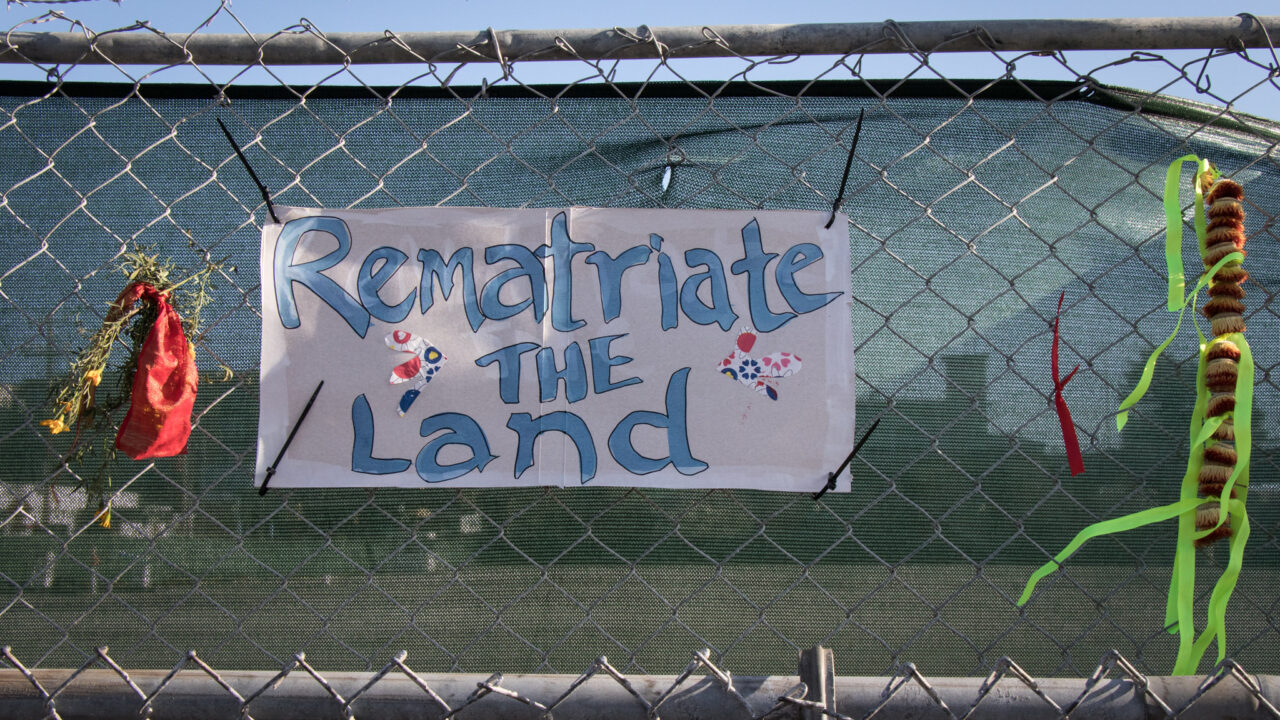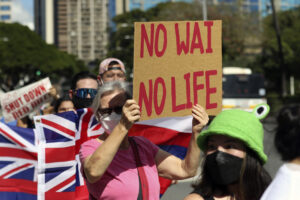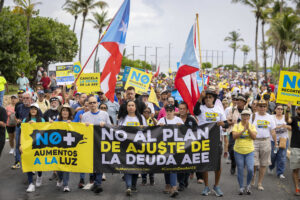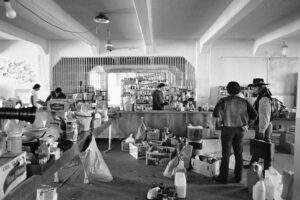Indigenous Women Are Reclaiming and Restoring Ancestral Land
Corrina Gould, co-founder of Sogorea Te’ Land Trust, explains the concept behind rematriation and how it extends beyond the movement to return land to tribes. Rematration is about thinking about the next seven generations. (Photo: Flickr/cc)
Rematration is about thinking about the next seven generations. (Photo: Flickr/cc)
In East Oakland, California, traditional and medicinal plants like sage, tobacco and mugwort grow on a quarter acre of land alongside fruits and vegetables. For Corrina Gould, it’s a piece of her tribe’s ancestral homelands.
Gould is the tribal chair for the Confederated Villages of Lisjan, a tribe not recognized by the federal government. When that quarter acre was returned to the Sogorea Te’ Land Trust — an organization Gould co-founded with other Indigenous women — it was the first step in a vision to reclaim Indigenous land, a process called rematriation.
The organization defines rematriation as “work to restore sacred relationships between Indigenous people and our ancestral land, honoring our matrilineal societies, and in opposition of patriarchal violence and dynamics.”
They want the country to move away from seeing the land and its resources as something to extract from — a practice that is often associated with men’s domination — and toward viewing the land as something to take care of. Indigenous, women-led conservation, in Gould’s view, is one way to bring that balance back to the land.
Since that initial success, the land trust has successfully secured several other land transfers, including five additional acres from the city of Oakland. On the land, they’ve built community gardens, held traditional ceremonies and invited the broader community to rebuild relationships with land that are based on reciprocity rather than ownership.
They want the country to move away from seeing the land and its resources as something to extract from — a practice that is often associated with men’s domination — and toward viewing the land as something to take care of.
“We can imagine reopening creeks and fixing watersheds again, and bringing salmon home and teaching our kids how to restore things, and plant things that are good and to take out invasive things, and watch our bees return and be resilient,” Gould said. “Those are the dreams of rematriation.”
The success they’ve seen in Oakland is part of a growing trend. According to one tracker compiled by researchers at the University of Kansas, there have been at least 90 instances of land being returned to tribes publicly in the past five years as part of what’s become known as the Land Back movement.
The 19th spoke to Gould about the meaning of this larger movement, the work of Sogorea Te’ Land Trust and how people living on stolen land can be a part of rematriation efforts.
This interview has been lightly edited for length and clarity.
Jessica Kutz: Could you talk about what rematriation means? Is it synonymous with the Land Back movement, or is there a different meaning behind the word and what it symbolizes?
Corrina Gould: I think there are a whole bunch of different ways of looking at it: rematriation versus repatriation, for example. Repatriation is really about war and men having to repay back for the destruction that they’ve done. But rematriation is about bringing people in in a different kind of way.
It’s about looking at what our Indigenous epistemologies tell us about women’s leadership in our tribal ways and how our women are first leaders in our families, but also leaders of tribes in many cases. They’ve made the decisions of when people harvested in the ceremonies that happened, and in some cases went to war. It was the women and the mothers and the grandmothers that decided that because they’re their life givers. We are talking about women in broad terms. We are also talking about our nonbinary relatives who were an important part of our traditional ways.
When colonization happened on our lands, those roles were taken away, they were stripped away from women.
When colonization happened on our lands, those roles were taken away, they were stripped away from women, from being in those leadership roles, from making decisions for the good of the entire tribe and their families. But it’s also about understanding that men’s traditional relationships and roles were also stripped away, and so bringing them back to their center as well.
The idea of rematriation is going back to what our traditional values are, of taking care of the land and the waters and that reciprocity and ensuring that everyone had enough. Which is not what we see in today’s society, when so many people are starving, or so many people are without homes. That’s not a traditional value, nor did it exist within our communities.
Was it an intentional decision to have an all women-led Indigenous land trust? Why do you think it’s important that women lead this work today?
It was definitely intentional. Johnella LaRose [co-founder of Sogorea Te’] and I started this land trust without an idea of what a land trust was, it came to us kind of as a gift, I call it. Beth Rose Middleton, who is now on our board, at that time she was a friend of ours and an ally, and she wrote a book called “Trust in the Land.” She invited me to a meeting of Native land trusts in Southern California about six months after a takeover of a sacred site in 2011.
I’m sitting in this room, and I’m hearing these incredible stories, I’m seeing Indigenous men leadership. I’d seen a few women in the room, but they’re mostly the assistants, they’re not in the leadership. I met this guy, Dune Lankard, who saved 140,000 acres of tribal territory in Alaska, after the Exxon Valdez spill. So at lunch one day, I asked Dune, “Hey, Dune, is this a boys club?” He laughed and said, kinda but not just Native land trusts, but all land trusts across the country are mostly run by men. And so that thought really stuck with me.
I talked to Johnella about this idea of this boys club and these men that were leading it. We began to have this conversation about what has happened to the Earth with men being in charge of land and the destruction and the taking, and what has happened to women’s bodies that still correlates to what’s happening today. Even today, we see that men are still making decisions over women’s bodies in this country.
And so if women were to begin to take that leadership role, not in a patriarchal way, but in a way that really takes us back to our Indigenous roots, wherever those are. We understand that as women leaders, we take care of the whole, not just the few. And so really, it really resonates with what’s happening with the world right now. That there needs to be women’s voices and women’s leadership in making sure that we survive.
Rematriation as you described is about more than just landback or a transfer of ownership. It seems it’s more about how you think of that land and caretaking for it. I’m wondering if you could talk about what rematriation looks like at Sogorea Te’?
The first piece of land that was returned to us was a quarter acre of land in East Oakland by a nonprofit that works with formerly incarcerated men and women and recently migrated folks. That quarter piece of land sits along the Lisjan Creek, the waterway that we were named for. This particular piece of land came back to us in this miraculous kind of way, because it’s probably on or very near a village site that my ancestors have been on for thousands of years.
The Lisjan nation became homeless in their own homeland, most of the folks that are from our tribe have been pushed out, we were the first people gentrified out of our own areas. So rematriation is really about taking care of all of that. But rematriation and the work that we’re doing around Land Back, is also about tending to the land that brings back California native plants.
It invites young Indigenous people to come and work with us as land stewards that don’t necessarily have experience doing land work. It means creating a youth program that reconnects the next generation of young people, of BIPOC youth, that will learn about the land and the waters and living there along with it. It means that we are encouraging people that live in our territory to come help us take care of that land, to help us by paying shuumi to see land rematriated, to create a different world together.
So you just mentioned paying shuumi to support rematriation. Can you explain what shuumi is?
A shuumi means a gift in the Chochenya language. And we were not the first ones to come up with the idea, I always like to preface that. It’s an honorary tax that allows people that can’t get out to the land with us but want to see the work happening to really be a part of that work with us.
We created a platform on our website that actually figures out what a suggested donation or shuumi might be for you if you own or rent in the Bay Area in our territories. Sogorea Te’ has actually worked with probably a dozen other tribes and native organizations across the country to start their own platforms.
We asked people that if you’re not living here and on our territory to look one up and see if there’s one close by that you can help. Look at the website nativeland.ca, and there’s a map that will tell you whose territory you’re in and what languages were there. And you can plug into the local organizations that are doing work in their own territory, and find out how you can help in your own homes.
What other ways can people support rematriation where they live?
If you look around at all the trash that’s around, pick up the trash, get your neighborhood together and do that work to keep the trash out of our bays and out of our ocean. It’s about doing your part in helping to take care of the Earth, which is our job as Indigenous people from the lands that we’re born to but we can’t do that by ourselves anymore. So we need everybody that now lives in our territory to take up that work with us.
Rematration is about thinking about the next seven generations. And it’s not just our kids who have to survive, but everybody else’s has to survive along with us. And that doesn’t mean that you’re going back to wherever you came from, but learning how to live and respect here on the lands that are now taking care of you.
Your support matters…Independent journalism is under threat and overshadowed by heavily funded mainstream media.
You can help level the playing field. Become a member.
Your tax-deductible contribution keeps us digging beneath the headlines to give you thought-provoking, investigative reporting and analysis that unearths what's really happening- without compromise.
Give today to support our courageous, independent journalists.






You need to be a supporter to comment.
There are currently no responses to this article.
Be the first to respond.